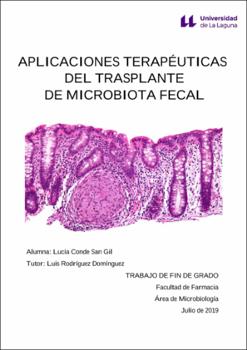Aplicaciones terapéuticas del trasplante de microbiota fecal
Author
Conde San Gil, LucíaDate
2019Abstract
Introduction: In the recent years there has been an increase in the number of studies to
evaluate the possibility of using the faecal microbiota transplantation (FMT) as a therapy
for different diseases. This has been due to the growing knowledge on the relationship
between the gastrointestinal microbiota and health and, therefore, on the role of dysbiosis
(the alteration of the microbiota composition or function) in the development of several
diseases.
Objectives and Methodology: In the present work, a bibliographic search was carried
out by using the point-Q searcher of the University of La Laguna Library to evaluate the
possible therapeutic applications of FMT in some intestinal pathologies, particularly in
the colitis by Clostridium difficile (CDI), in the Inflammatory Bowel Disease (including
both Ulcerative Colitis and Crohn´s Disease) as well as in the Irritable Bowel Syndrome.
Results, Discussion and Conclusions: In the three diseases studied the FMT technique
has been effective in some of the cases, particularly in the treatment of CDI, in which the
efficacy of this treatment is around 80-90% in those cases of patients unresponsive to
antibiotics or with recurrent infection. In the other diseases the obtained results have not
been so positive and additional studies are needed to drive out valid conclusions and to
clarify technical aspects such as the best administration route, the sample preparation, or
the safety profile, among others, with the aim of standardizing the process and to establish
optimal treatment protocols. Introducción: En los últimos años se ha incrementado el número de estudios para evaluar
la posibilidad de empleo del trasplante de microbiota fecal (TMF) como terapia en
distintas enfermedades. Esto se debe al conocimiento creciente sobre la relación existente
entre la microbiota gastrointestinal y la salud y, por tanto, el papel de la disbiosis
(alteración de la composición de la microbiota o de su función) en la aparición de ciertas
enfermedades.
Objetivos y Metodología: En este trabajo se ha realizado una búsqueda bibliográfica, a
través del punto Q de la Biblioteca de la Universidad de La Laguna, para evaluar las
posibles aplicaciones terapéuticas del TMF en algunas patologías intestinales, en
particular en la colitis por Clostridium difficile (CDI), en la enfermedad inflamatoria
intestinal (incluyendo la colitis ulcerosa y la enfermedad de Crohn) y en el síndrome del
intestino irritable.
Resultados, Discusión y Conclusiones: En las tres enfermedades estudiadas el TMF ha
resultado eficaz en algunos de los casos, en particular en el tratamiento de la CDI, en la
que la eficacia del tratamiento es del orden del 80-90% en los casos de pacientes que no
responden al tratamiento con antibióticos o con infección recurrente. En las otras
enfermedades, los resultados obtenidos no han sido tan positivos y se necesita llevar a
cabo estudios adicionales y de calidad para sacar conclusiones válidas y esclarecer la
influencia de aspectos técnicos tales como la vía de administración, la preparación de la
muestra o el perfil de seguridad, con objeto de estandarizar el proceso y elaborar
protocolos óptimos de tratamiento.





